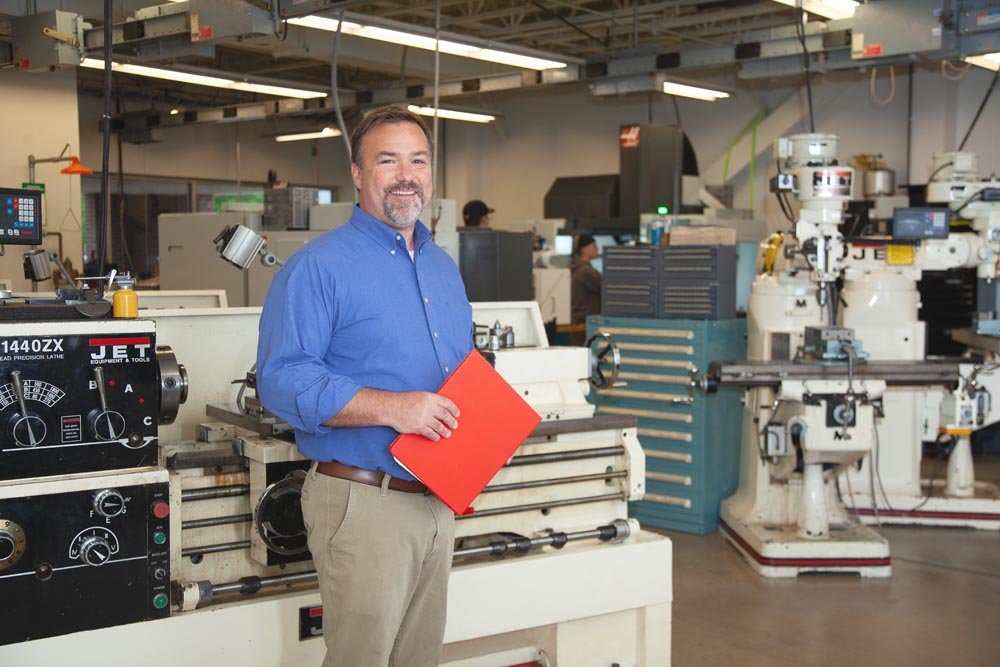YOUR BUSINESS AUTHORITY
Springfield, MO
YOUR BUSINESS AUTHORITY
Springfield, MO

During an April 16 visit to Ozarks Technical Community College, Gov. Mike Parson pointed to 500 training opportunities available at two-year higher education institutions around the state.
Parson announced a certified production technician credential would be offered at colleges, such as OTC, that have a standardized Manufacturing Skill Standards Council credential, according to a news release from the governor’s office.
“One out of four jobs in Missouri directly supports our strong manufacturing industry,” said Parson, who spoke during OTC’s advanced manufacturing job fair, in the release. “It is important we remain focused on building and ensuring that our workforce is prepared to meet the demands of tomorrow. Today, we recognized employers who are committed to taking the steps to ensure that workers are adequately trained and have opportunities to succeed.”
Mardy Leathers, director of Missouri’s Division of Workforce Development, said the state set aside funding – up to $1.5 million – to pay for as many as 500 people to receive the credential.
“These are things that businesses have invested in before,” he said. “We’re trying to help out.”
The certified credential was the result of conversations community colleges had with manufacturing leaders last year, said Sherry Coker, executive director at OTC’s Center for Workforce Development. For students, they say the credential validates some soft skills but also teaches the concepts of safety and helps them recognize quality work.
“It certifies someone at an entry level to be employable, specifically in the manufacturing sector,” she said.
Stressed skills
Receiving a CPT designation requires passage of exams in four areas: quality, safety, manufacturing processes and procedures, and maintenance awareness.
“These are basic skills that industries told us are important,” Coker said.
Vicki Buraczynski, office manager at OTC’s Center for Workforce Development, said the four modules are split into two sessions with each providing 45 hours of training. In total, the sessions cover nearly eight weeks.
“It’s designed so they can take the first one – quality and safety – which makes them employable,” she said. “But to get the certification, they must take all four modules.”
Months before Parson made his announcement at OTC, Buraczynski said the college held a trial cohort for the manufacturing program.
Between Jan. 17 and March 14, four students completed the training taught by OTC instructor Bryan Harvey.
Formerly an adjunct staff member at OTC, Harvey said he’s had to focus more on his budding business, Harvey Automation Technology and Software LLC. Still, he makes time to teach at the community college as he said, “it’s a very complementary situation” for him to work in school and business.
Harvey said being in the manufacturing industry keeps him current on trends he can share with students, much like school educates him on training and hiring needs of local companies.
“I learn every time more than the students,” he said. “That’s one of the great things about teaching. If you’re doing it right, you’re learning more than they are.”
Coker noted the first cohort aimed to serve at-risk young adults, and several of them were unable to stick with the program for the eight-week period. However, she said a more diverse group would participate in future sessions, with the cohort to be capped at 20 students.
The students who complete the CPT credential could earn an annual starting salary of $30,000, officials say.
The next cohort’s two sessions at OTC are scheduled Aug. 5-29 and Sept. 3-25, Buraczynski said, with the enrollment period now open and continuing until mid-July.
Although smaller class sizes allow for more individual instruction time, the demand for more skilled workers is high, Harvey said.
“It would be great to get more people in,” he said.
The summer cohort will be held during the day, but OTC officials say future sessions could be offered in the evenings.
“It’s designed to be flexible,” Coker said. “That’s our goal to accommodate all kinds of scheduling. It’s still a work in progress.”
Talent search
Finding qualified talent is an ongoing struggle, Coker said. The state’s seasonally adjusted unemployment rate is currently 3.3% in March, according to the Missouri Department of Economic Development, below the national average of 3.8%. For employers, it’s not just about finding a person, but finding “a purple unicorn,” she said, which is the right person with the right skill set for the job.
“For our students, having this certified production technician credential is a career pathway to manufacturing,” Coker said.
Jobs in the state’s manufacturing sector have been on the rise since 2018.
The DED reported manufacturing jobs for March at 277,400, up 6,400 jobs from 12 months prior – an increase of 2.4%. Missouri’s private-sector advanced manufacturing industry employs more than 202,000 workers.
More than a quarter of Missouri jobs support the manufacturing industry and that figure is expected to grow nearly 10% by 2026, according to the DED.
OTC is working to become a key site for advanced manufacturing. The community college has plans in the works for a $20 million Center for Advanced Manufacturing and Technology, to be developed on its Springfield campus.
A franchise store of a Branson West-based quilting business made its Queen City debut; Grateful Vase launched in Lebanon; and Branson entertainment venue The Social Birdy had its grand opening.
$2M in tax credits awarded to SWMO nonprofits
Baldwin, Lathan to chair United Way campaign
Produce recall impacts food sold at Walmart, Aldi and Kroger
Mixed-used development proposed in KC area
Tax deduction program for farmers set to launch
Report: Panera explores sale of Caribou Coffee, Einstein Bros Bagels